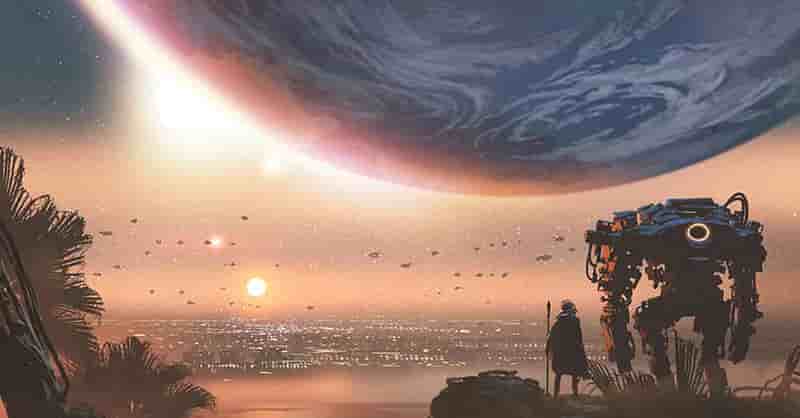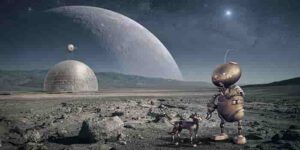Immersive world building comes down to one goal: bring the audience into the story, especially in genres like sci fi and fantasy. This means making the audience believe your characters are inhabiting a real world.
Consider these elements while worldbuilding for a fantasy or sci fi story:
Aesthetic—Inspiration
What I mean by aesthetic is inspiration. I love coming across something that inspires me—it’s a major spark for creativity. It could be a genre, a style, a specific scene, characters or overall vibe of a story. In other words, it’s the feeling of oh that’s a good idea, let’s explore that further.
Consider what genres you want to play with. Mix and match stuff that seems odd.
For example, George Lucas mixed inspiration from early pulp sci fi like Flash Gordon with Wild West adventures. He was also inspired by Japanese movies like The Hidden Fortress and others that featured wandering, katana-wielding ronin. He flavored his Star Wars setting with gunslingers, wizard samurai-ronin, alien monsters and anxious robots. If you think about it, the influences are all over the place. However, that’s what makes it so good.
Somehow, it works. On the one hand, high fantasy works well with a certain WW2 villainous party in the whole “evil emperor” thing. We get our black knight character, an evil wizard and an unstoppable weapon. Then, throw in the wandering cowboys and ronin from a desert planet to save the day. You touch so many different genres, but they all work together to tell the story. Rustic heroes defeat the power-hungry villains.
The 5 Senses
Alright, got your bid idea? Great. Let’s bring it back down to earth.
Engaging with your character’s senses really opens an imaginary environment. Our sensory perception is how we interact with the world outside of our minds. Often, we imagine the worlds we create in visual terms. However, to really create an experience, we need to engage in how the environment feels, smells, sounds, etc.
These other senses are the tools we use to navigate our world, but maybe it’s just more of a subconscious process. That is, until something really stinks. Then, we’re suddenly reminded of our sense of smell.
I’ve grown to love exercising this in my day-to-day life in something I imagine as connecting with the elements. Not the periodic table, but the ancient sense of fire, water, earth, air, etc. Stepping away from our brains to touch grass, jump in a pool or get fresh air is crucial, so why not use that as a meditation? Remember the feelings and oddities in the natural world around you and use that for your created worlds.
This is more relevant in spectacular settings, since the whole point is to give your audience an extraordinary experience.
Nature
By nature, I mean the baseline, physical reality of your world. What it looks like outside, so to speak. This could include how an alien civilization evolved on a planet or how primordial gods shaped your magic world. Either way, once you understand what forces created your world, you can expand into all kinds of terrains within the world.
Let’s do a sci fi story where explorers land on a verdurous planet full of exotic life.
- Is the planet similar to Earth in heat? This will dictate how environments develop. Think deserts and jungles for hot planets and tundra and forests for colder planets.
- How about gravity? This will not only affect your characters physically, but the way the wildlife looks on the planet. High gravity equals something crab-like in my opinion. I feel like we have a universe full of crabs.
- How competitive are the evolutionary forces of this planet? After surviving the basics of food, water and shelter, what lurks outside is the next concern. Highly competitive worlds that are otherwise super life supporting may have some wild lifeforms. Be wary.
- How compatible are the genetics of this world and your own? If the genetics are compatible at all, you’re gonna’ be in trouble with viruses and microorganisms.
- Is this place awesome, or what? Don’t forget to enjoy the strange, alien environments you explore. Strange flowers and other oddities can be as big or little as you want. It’s all fun.
Once you understand these broader forces, you can create other environments inside that world. Naturally, the environment will change depending on where your characters travel. Even within short distances, the environment around a body of water will be different than a mountain forest.
The little details matter.
Related Posts:
Writing a Space Western: How to Write Cowboys in Space
| How to Start a Sci Fi Short Story
|
Technology
Then, you’re going to need to figure out what your civilization looks like. Basically, what technology does the world use? This is a baseline for economics and political structures, so you can further develop those after you figure out the level of technology. For example, the world became drastically different once the Industrial Revolution hit, making the modern economics we know today.
Really, what are the limitations of your given technology? It’s always fun to watch characters problem solve—especially when it is creative. You can stoke this creativity by setting limitations—even when the technology is advanced. Your character may not be able to warp out of a dangerous situation, but they will have the knowledge to navigate the situation in other ways.
Low Technology
For this example, I’ll go the opposite direction with a prehistorical fantasy setting.
- Naturally, weapons for hunting and war need to be defined. Are there swords in this world, or is it just spears, clubs and axes? What about archery?
- Consider running into civilizations that utilize agriculture as well as hunter-gatherers. What are the major differences in attitude, culture and the arts?
- How do your characters utilize the tools they have to survive? Think stone knives, salves, sewing, snares, furs and other everyday survival items the characters utilize.
- How does new technology affect the course of the world? What if one kingdom found the technology to create bows and arrows before its surrounding neighbors?
High Technology
For sci fi genres, the technology is commonly on the sophisticated side.
But this doesn’t have to follow the same path humans have taken. Maybe another alien civilization chose a more biological path with their technology as opposed to machines. Technology is a broad term, so we can expand that to mean many things. However, it often follows a culture’s values, so remember to bake that into why a certain technology has evolved.
Also, you’re gonna have to brush up on theoretical science and do some hocus pocus to make your technology believable.
Sometimes, this comes from a breakthrough in engineering. We can take a theoretical concept, like quantum entanglement, and finally have engineering feat that warps a ship across the universe. Maybe diving into a super-massive black hole does the trick. On the other hand, we could go with the concept of alien technology. Honestly, that’s a fair workaround for explaining things—it’s always mysterious.
Technology and Magic
Leaning into the fantasy genre, you’ll still need to decide how your society works. Magic gives you a great opportunity to invent wild technologies.
The key is to ask yourself how can these forces be harnessed by machinery? A popular answer to this question is the magic crystal trope—gems harnessing magical properties and acting as batteries. You’ll often see this in Steampunk worlds. Netflix’s Arcane is a great example.
Of course, you can also mix space-aged technology with magic like a space opera. Once again, Star Wars is a great example. I don’t mean to harp on the subject, it’s just Star Wars is a great example of everything. Anyways, think about how the force interacts in a world of space-aged technology. It is a sacred energy bound to life and creation, where machinery is often connected to destruction. Think of how Luke’s journey was symbolized by his need for a robotic hand. The question throughout Return of the Jedi was, is he going to turn to the dark side like his cybernetic father?
Cultures
I touched on culture, but it goes further than technology. You have to think about the differences in the way people think. Truth is, humans are wildly different from each other in many ways (and wildly similar in others). We can absolutely stretch that further with alien or otherworldly civilizations.
Consciousness is a weird thing. However, it’s also a cool thing. The fact that people have different points of view is not only an inherent thing we need to get used to but also an interesting fact about conscious minds. Not only do individuals express themselves in unique ways, but cultures make their own unique shared aesthetics, beliefs and arts.
Star Trek does a great job of creating otherworldly cultures based on what we’ve seen on earth. Some cultures will be warlike—maybe we are the warlike culture in the galaxy. Other cultures have no belief in individuality, like the nefarious borg. Still, others are peace-loving cultures that have evolved as a conscious species. Encountering any of these cultures has its own unique experience.
Fashion Aesthetics
What are people wearing? I know it seems minor in an article that’s trying to hit broad points in world-building. However, you will be describing peoples clothing frequently as characters enter scenes. It says so much about a character outside of behavior. Think about how people express confidence, cleanliness, sophistication, creativity, a devil-may-care attitude with buttons unbuttoned. It goes a long way.
The popular fashions of a certain civilization will express broader values that society carries. For example, a civilization that celebrates humility and selflessness may be less extravagant in their dress. On the other hand, cultures who value individuality and self-expression may have brightly colored, oddly shaped designs.
Interaction with the Natural World
How does the natural world affect the culture? Is it a safe civilization with plenty of resources?
The foundation of these things has to do with the environment. Heat, weather and wildlife all can play a role in the way a culture dresses, behaves and constructs buildings. At the very least, you’ll see changes in fashion during seasonal changes or in different kingdoms or lands. Likewise, the designs of simple buildings will vary depending on climate needs.
What if the world is full of dangerous creatures? A savage, alien planet or a kingdom afflicted with dragons will include defensive construction and everyday weapons as a part of the overall culture.
Of course, every culture adds an interesting flair to their design choices and not everything is about essentials. Start with needs, then flavors of individuality and cultural designs will emerge.
Values and Worldviews
What values are most prominent? Religion? Spirituality? Wealth? Honor?
This dictates everything from social customs to economics to politics.
Obviously, these values and worldviews will build the underlying politics of your world. It’s a strange mixture of resource allocation and people’s perspective on how that should be allocated. Sometimes, these views can be skewed by powerful forces. It’s far easier to manipulate the public than control it by force. Remember this when building dystopian worlds.
Religions will be just as varied as they are in real life—even if you place gods as active characters in your story. You’ll need to make a distinction in how these gods (or god/God) may or may not interact in your world. Some will outright show up, while others may be acting in the background or are just flat-out unreal.
Communication
How do these beings think and communicate with each other? Conscious minds affect each other. At the very least, there is a need to communicate that comes along with the need to cooperate and even build a civilization in the first place.
Naturally, technology is going to play a huge role here. The internet, phone, telegram and Guttenberg press were all major milestones in mass communication. It changes things in a major way. What the Gutenberg press did for religion was extraordinary, giving everyone access to a Bible. Fast forward a little bit and think of how the Internet has changed modern politics. It’s nuts.
However, this also bleeds over into the fine arts: theater, visual mediums, philosophy and storytelling. What’s going on in the zeitgeist of the culture that is on the top of its citizens’ minds. What do the outliers think and how do they express those thoughts?
Wrapping up some thoughts
Again, we could go on and on about worldbuilding. It’s a topic that could have an entire course worth of subject matter. You’re literally building something as complex as the real world. However, if you get a solid concept in mind and plant your characters in the scene, you’ll be able to come up with fascinating aspects of your world you didn’t think about before.
I’m a big believer in finding your story through writing it, but organization is essential to creating something cohesive. You don’t necessarily need to know every corner of your story’s world, so you can figure details out after building the initial skeleton, so to speak.



